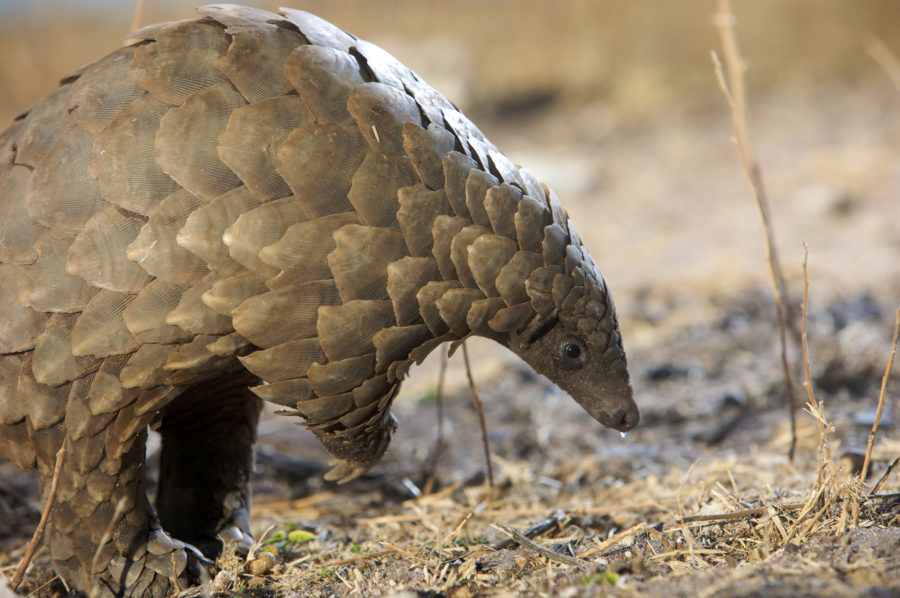In Cameroon, endangered pangolins are sold for their meat and smuggled to Asia for their scales. Conservationists and the government of Cameroon are intensifying their efforts to clamp down on this illegal trade. In February 2017 3.5 tonnes of pangolin skins and scales seized from poachers were destroyed in Africa’s first ever burn of this type.
Ahead of the Global Conference on the Illegal Wildlife Trade in London in October, the British High Commission in Cameroon and the Zoological Society of London (ZSL) organised a workshop in Yaoundé on June 28. Tackling IWT as a serious organised crime was one of the topics discussed.
David Olson is the ZSL’s Cameroon Programme Director. He speaks about how the charity is helping train customs agents in Cameroon to improve interception of smuggled pangolin scales:
International traffickers
Cameroon is now a key exporter of African pangolins to Asia. The authorities In Hong Kong and China seized around 4 tonnes of pangolin scales that were from Cameroon in 2016. Another 5.4 tonnes were seized here in early 2017. Last year’s seizure alone represents the scales from between 10,000 and 20,000 pangolins. Improving law enforcement in Cameroon is imperative to deter traffickers and reduce incentives for poachers.
We’ve noticed a shift in the last few years. Before that, poachers were mostly trading pangolin for local consumption – selling their meat, basically. Now the poachers are supplying scales to international traffickers.
Caught in snares
Pangolin have been long hunted for meat in Central Africa – they are still considered a delicacy. They are widely hunted and are commonly sold in bush-meat markets or alongside the roads. They are often caught in snares.
Recently there have been reports of poachers in Cameroon hunting giant pangolin – which have particularly large scales and lots of meat – with dogs while the pangolins are in their burrows. This suggests poachers are increasingly targeting this endangered species.
Giant pangolins are now less commonly observed on sale in outdoor markets. Reports suggest that the market has gone underground since it was recently classed as fully protected under CITES Appendix I.
The increased demand for scales and meat means that all three Cameroonian species may be extirpated over large areas of the landscape over the next decade. However, we don’t have much information on their natural history and conservation requirements. We think they reproduce slowly and populations cannot sustain heavy hunting. This is a priority for conservation research.
3.5 tonnes of pangolin scales burned
Ahead of World Pangolin Day on 18 February, the government of the Republic of Cameroon conducted Africa’s first-ever public burn of confiscated pangolin scales, marking the country’s commitment to the conservation of the world’s most heavily-trafficked wild mammal.
Facilitated by conservationists from the Zoological Society of London alongside a number of other non-governmental organisation (NGO) partners and hosted by Cameroon’s Minister of Forestry and Wildlife Ngole Philip Ngwese, the event saw the destruction of 3.5 tonnes of pangolin scales. These scales were all seized from poachers and traffickers.
Customs agents trained
Pangolin scales are shipped overseas by both container ships and airlines. The Zoological Society of London has been working with the Cameroon government to train customs agents in both ports and international airports to identify and detect pangolin scales and to make arrests, handle evidence, and build and support cases.
We’d also like to see airline companies, in particular, be engaged at corporate levels so that there are more extensive checks on cargo to ensure that no pangolin parts are being transported.
Fingerprinting kit for pangolin scales
Working with the University of Portsmouth and the UK Border Force, the Zoological Society of London helped develop this kit. It uses gelatine ‘lifters’ to make fingerprints visible on pangolin scales. Using this kit, law enforcement agencies will use these prints to try to find out who has been in contact with the scale.
Databases of pangolin DNA are being developed over the next few years. These will help identify where poached pangolins came from by their scales. That should help us better understand the trade.
Have your say:
What more do you think should be done to help protect pangolins?
The UK is committed to the fight against the illegal wildlife trade and will be hosting a global IWT conference in London in October.

